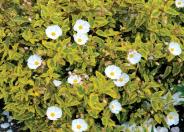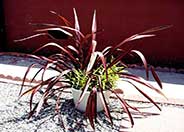
Common name:Sea Lavender, Statice
Botanical name:Limonium perezii
This mounding shrub will reach about 3' high and has large, dark green leaves with small blue and purple flowers that bloom in spring and summer.

Common name:Rockrose
Botanical name:Cistus 'Mickie'
This stable variegated form of Cistus hybridus has a low mounding habit that hugs the ground and creates a super colorful, evergreen colorspot. 'Mickie' hails from northern Washington State and has survived some brutal winters. Charming white flowers punctuate the flashy foliage in May and June. Use in fall mixed containers like you would use Coleus in summer. This perennial quickly reaches 18" tall and spreads 36". It does best in full sun and prefers poor to moderately fertile soil with good drainage. Tolerant of mildly alkaline soils. Best pH range: 6.5-8.5. Water deeply and infrequently once established. Drought tolerant. Similar to the British variety 'Gold Prize', this stable variegated form of Cistus hybridus has a lower, mounding habit and has stable variegation. Use as a low mounding shrub as an accent or in mass planting. Use in fall in containers with several plants. All Cistus prefer dry, sunny habitats and poor soils.

Common name:Rock Purslane
Botanical name:Calandrinia grandiflora
This perennial will grow 12-36" and produces large blue/green rosettes that last for a long season. It produces large, silky, lavender/pink flowers that have lime/green, purple spotted calyces.

Common name:Dazzler Flax
Botanical name:Phormium 'Dazzler'
Dazzler Flax is a New Zealand flax with large reddish leaves from 3-6' in height.

Common name:Royal Burgundy Barberry
Botanical name:Berberis thunbergii 'Royal Burgundy'
A deciduous deep burgundy leaved shrub with upright/mounding branches which reaches 2 ft high and 2-3 ft wide. The foliage becomes reddish burgundy in summer and fall. Similar to 'Crimson Pygmy' but a deeper, richer color.
Designer:
Photographer: Vicki Anderson
Maintain a two to four inch layer of mulch on the soil surface to reduce weeds, infiltrate rain water, and reduce compaction.
Develop healthy soil for plants that are vigorous and naturally pest-resistant.